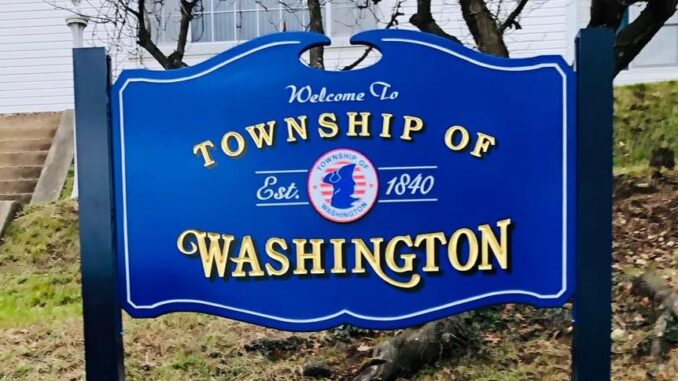
TOWNSHIP OF WASHINGTON—Township Council approved a nearly $117,000 proposal, Feb. 21, for continued soil and groundwater monitoring at the former DPW facility grounds, required as part of its state-regulated environmental cleanup of gasoline and diesel contamination that led to the razing of the facility.
The resolution was approved, 4-0, with councilwoman Stacey Feeney absent due to not being able to access the meeting remotely.
Pascack Press requested a copy of Lisko Environmental’s proposal; no costs were noted on the council agenda’s approved resolution.
The council has proposed plans to build a new $5 million DPW facility on the site of its predecessor, which was remediated under supervision by Lisko Environmental, its licensed site remediation professional, or LSRP.
The approved $116,695 proposal, with additional consulting “to be determined,” and a possible proposal for additional groundwater monitoring, outlines 12 steps to be completed by Lisko Environmental of Belmar that may conclude most required soil monitoring and also provide steps needed for continued groundwater monitoring.
Councilman Steven Cascio noted Feb. 21 that he thought environmental remediation had been concluded on the DPW site. However, Township Attorney Ken Poller told him that NJDEP still requires monitoring on site, including “extractions” from soil and groundwater testing sites.
Cascio said he recalled there were “a couple sites” that required monitoring near the DPW (formerly the Department of Municipal Facilities, or DMF) headquarters.
The 12 steps outlined in Lisko’s approved proposal include:
- Monitoring well survey, $2,750;
- Groundwater sample collection (eight rounds) $74,130;
- Hydrogeologic characterization, $3,010;
- Utility markout and ground penetrating radar, $1,610;
- Installation of soil borings, $12,075;
- Soil modeling for alternative/site-specific standards, $2,500;
- General oversight and correspondence, $6,300;
- Remedial action report for soil, $6,250;
- Deed notice and supporting documents, $4,000;
- Soil remedial action permit application, $2,500
- Response action outcome letter, $1,750;
- General consulting, to be determined.
The proposal notes that once the Remedial Action Permit for soil is issued by NJDEP. The Response Action Outcome letter (cited above) “conditionally closes the soils portion of the case with the permit in place.” It further notes that the permit will require “post-closure monitoring/certification every two years for the life of the permit.”
The report notes that all recommended tasks for soil remediation and reporting are included in Lisko’s scope of work. However, it adds, although groundwater sampling is included in the scope of work, “additional tasks may be necessary for groundwater contamination.”
Additional groundwater tasks and NJDEP reporting will be included in a forthcoming proposal, states the approved proposal.
Site’s history
Lisko’s proposal notes investigations were completed at the site in 1998, when two 3,000-gallon gasoline tanks and one 2,000-gallon diesel tank were removed from an area in front of the DPW building. It noted gasoline contamination from a loose fitting and said soil samples of an excavated area exceeded then-NJDEP cleanup standards.
Within six months of that, the report states “a nearby potable well was impacted by gasoline contamination from the site.” This potable well was subsequently abandoned and connected to city water at the township’s expense, states the report.
The report notes extensive soil sampling for delineation took place from 1998 through 2007 with results indicating contamination extended beneath the DPW garage.
Moreover, the report said NJDEP had revised its Impact to Groundwater standards since 1998, making standards for benzene and other compounds more stringent.
In 2001, the report adds, staining was observed around a 275-gallon above-ground storage tank for waste oil.
The waste oil tank was removed and surface soil sampling did not show contamination levels above then-NJDEP cleanup levels; however, groundwater sampling showed cadmium above groundwater standards then and again in 2014 when it was resampled, stated Lisko.
In October and November 2021, soil was excavated from “areas of concern” where the gasoline/diesel tanks, and the waste oil tank were located, notes the report.
The report states soil samples taken near the gasoline/diesel tanks showed benzene exceeding NJDEP groundwater standards and ethylbenzene exceeding NJDEP standards for residential/non-residential inhalation exposure pathway soil remediation standards.
“Additional remedial action is necessary for soil contamination remaining at the site,” states the Lisko proposal. It recommends six actions, which it notes are included in the approved proposal’s scope of work.
The actions range from delineation of low levels of volatile gasoline compounds in soil; establishing a deed notice restricting property use to non-residential; and completion of a remedial action report and a remedial action permit, plus a final response action outcome letter that will detail long-term soil monitoring requirements.
In fall 2021, the council approved a nearly $200,000 contract with Lisko to remove 950 tons of contaminated soil from the former DPW site. The $193,541 contract to Lisko was to provide oversight and undertake the work.
However, the excavation work had been delayed then due to Covid-related concerns and the need to find alternate parking locations for DPW vehicles. (“See “950 tons to go; DPW soil remediation said to start Oct. 4,” Michael Olohan, Sept. 28, 2021.)
The award to Lisko in 2021 did not require competitive bids, said Township Attorney Kenneth Poller then, who said it made more sense to go with a professional services contract, as had previously been done on the DPW site, and retain the services of the environmental consultant that the council had used since remediation work started at the DPW site in the late 1990s.
